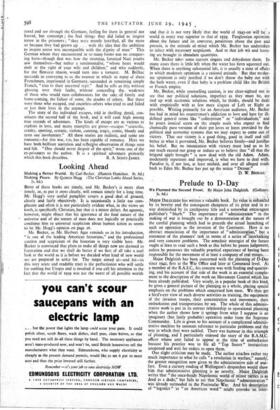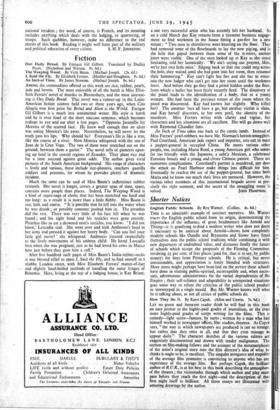Prelude to D-Day
We Planned the Second Front. By Major John Dalgleish. (Gollancz.
MAJOR DALGLEISH has written a valuable book. Its Value is enhanced
. . by its brevity and the consequent cheapness of its pnce and in no way diminished by its catchpenny title and a somewhat extravagant publisher's "blurb." The importance of "administration" in the making of war is brought out by a demonstration of the nature ot the careful planning which had to precede .the actual launching of such an operation as the invasion of the Continent. Here is no abstract enunciation of the importance of "administration," but a statement of the planners' task in terms of a series orinterlcicking and very concrete problems. The armchair strategist of the future ought at least to read such a book as this before he passes judgement, unless he possesses the valuable practical experience of having been responsible for the movement of at least a company of real troops_
Major Dalgleish has been concerned with the planning of D-Day since 1942, first at the War Office and later at Command level. As a member of the R.A.S.C., his concern was with feeding and-quarter- ing, and his account of that side of the work is an essential comple- ment to the description of the work on Movement Control which has been already published. Very wisely, in a popular book of this kind, he gives a general picture of the plann,ing as a whole, placing special emphasis on the problems which concerned him most. We thus get a bird's-eye view of such diverse activities as training, the equipment of the invasion troops, _their concentration and movement, their embarkation and transportation by sea. The whole of this adminis- trative work is put in its correct relationship to operational planning when the author shows how it springs frcm what I suppose is an imaginary (but fairly probable) operation order from the Supreme Commander. Life is given to his account of a complicated adminis- trative machine by constant reference to particular problems and the way in which they were tackled. There was humour in this triumph of planning, and I particularly enjoyed the story of the R.A.M.C. officer whose unit failed to appear at the time of embarkation because his practice was to file all "Top Secret" instructions unopened and wait for orders to open them.
One slight criticism may be made. The author attaches rather too much importance to what he calls "a revolution in warfare," namely-, the greater recognition now given to the administrative side of war- fare. Even a cursory reading of Wellington's despatches would show him that administrative planning is no novelty. Major Dalgleish writes that "the once-heady Napoleonic world of minor tattles is as dead as a dodo," but fails to see -that Napoleonic "administration" was already outmoded in the Peninsular War. And his description of "logistics " as "an American word" might provoke an inter-
national incident ; the word, of course, is French, and its meaning includes anything which deals with the lodging, or quartering, of troops. Such quibbles, however, make no difference to the real merits of this book. Reading it might well form part of the military
and political education of every citizen. S. H. F. JOHNSTON.



























 Previous page
Previous page